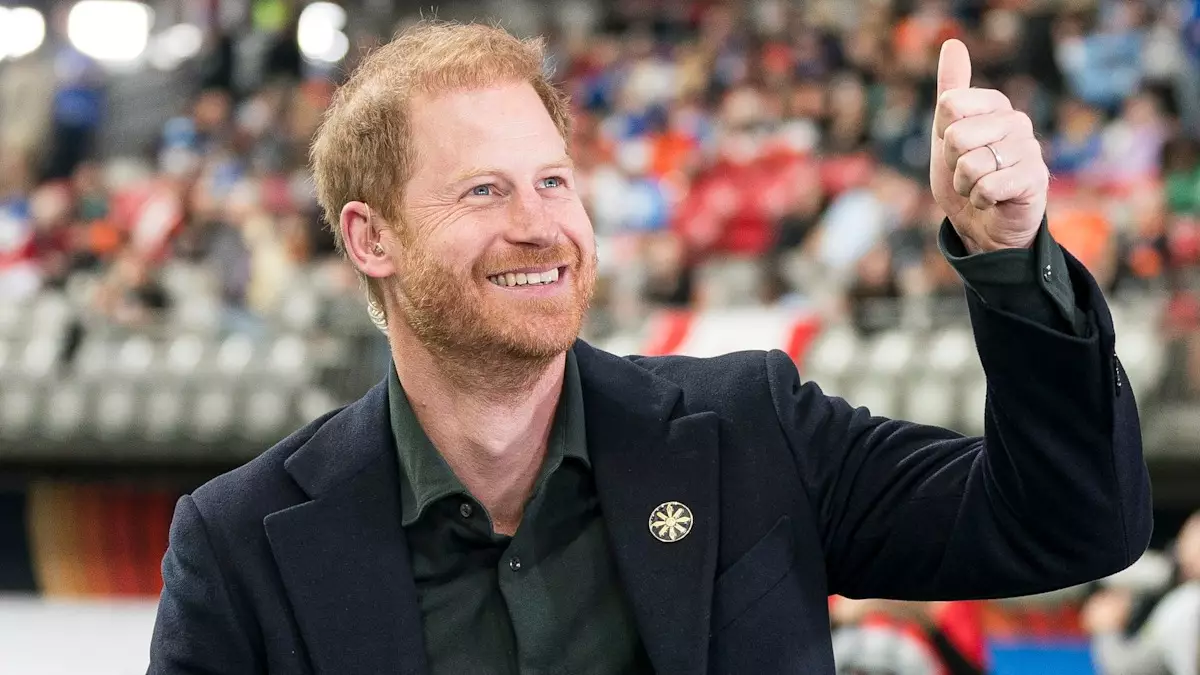In a seismic shift that has captivated public attention, Prince Harry’s journey from royal duties in London to a new life in Montecito, California, marks a significant turning point not only in his personal narrative but also in his linguistic identity. Over four years since he and Meghan Markle took on a fresh lifestyle infused with sunshine and autonomy, observers have noted an intriguing transformation in Harry’s accent and speech patterns. This evolution reaches beyond mere phonetics; it highlights the intersection of language, culture, and identity.
Harry, now 40, once epitomized a polished Etonian English accent, but recent appearances reveal a notable American influence. Notably, a lighthearted promotional video featuring Harry at East Side Ink tattoo parlor in New York provided ample material for speculation about his shifting linguistic identity. In the video, Harry engages with musician Jelly Roll, using American colloquialisms and phonetic shifts that have caught the attention of fans who observe that his British accent appears to be softening.
Comments flooding social media platforms, especially X (formerly Twitter), reflect a diversity of opinions, with many suggesting that Harry’s accent has taken on an American flair. Critics astutely point out phrases like “Screw it, let’s do it,” and his casual reference to a tattoo artist as “dude” in the skit. Furthermore, Harry’s playful suggestion of putting the tattoo in an American-influenced vernacular further strengthens this notion. These instances, coupled with his shifted intonation—ending sentences on a rising note—propagate the feeling that his British roots are yielding ground to a more Americanized manner of speaking.
The commentary from communication coaches offers a profound analysis of this linguistic evolution. Anthony Shuster points out the stark contrast between Harry’s speech and that of his family back in Britain, particularly emphasizing the relaxed articulation pervasive in Harry’s recent dialogues. Shuster’s insights reveal that while Harry’s identity as a royal remains intact, his linguistic choices reflect a conscious or subconscious adaptation to his surroundings.
The cultural dynamics of Harry’s marriage to Meghan Markle, a native Californian, cannot be overlooked as a significant factor in his changing speech patterns. Language specialists reveal that close interactions with someone who has different speech habits can lead to natural linguistic assimilation. As Harry embraces life in America, it is evident that his domestic environment plays a critical role in shaping his communicative style. The moment he introduced his son Archie to the world—with a softened intonation that mimics American speech—marks a pivotal point in this transformation.
Harry’s expression of happiness and fulfillment in his new life adds another layer to this narrative. He has openly shared his affection for California, indicating a deep emotional connection to the place he now calls home. By stating, “Our kids are bilingual, so they are going to flourish here,” he acknowledges the blend of British and American influences that his children, Archie and Lilibet, will naturally embody.
While some fans embrace this linguistic shift as a refreshing transformation, others express surprise, even discomfort, at Harry’s evident Americanization. His usage of American idioms, such as “awesome” and collective terms like “you guys,” during various engagements has sparked discussions about an evolving cultural identity. Linguistic adaptation might also be seen in the context of Harry’s intention to relate more closely to his new audience in the United States.
Observers note that this phenomenon of picking up new speech habits is not unprecedented. A look back at Harry during his gap year in Lesotho can provide a sharper contrast to his more contemporary speech. The clarity and articulation from that earlier period starkly juxtapose the laid-back style evident in his recent public appearances, further accentuating the linguistic evolution he has undergone.
Ultimately, Prince Harry’s evolving accent symbolizes more than just phonetic changes—it reflects a profound journey of identity and belonging. As a member of the royal family, he once had to navigate the expectations of heritage and tradition, but now, as a husband and father in the United States, he is navigating a new terrain where linguistic fluidity fosters connection and understanding. This transformation not only illustrates the impact of cultural immersion but also encourages us to consider how language shapes identity in an increasingly globalized world.

